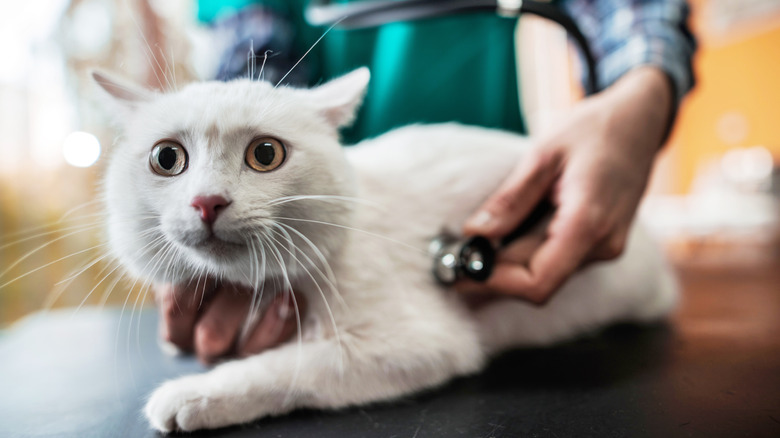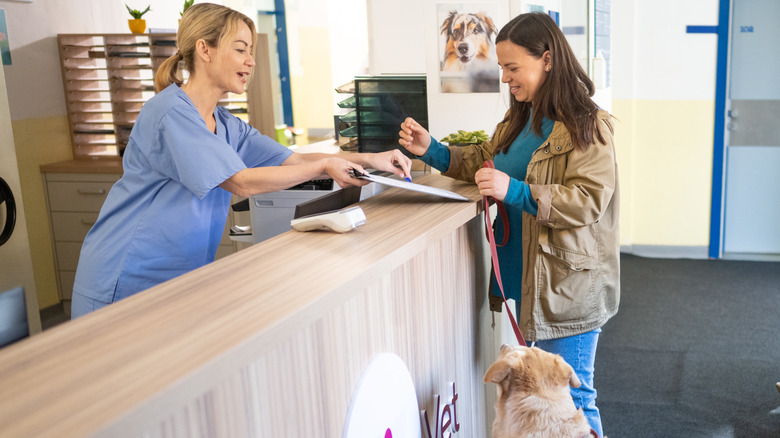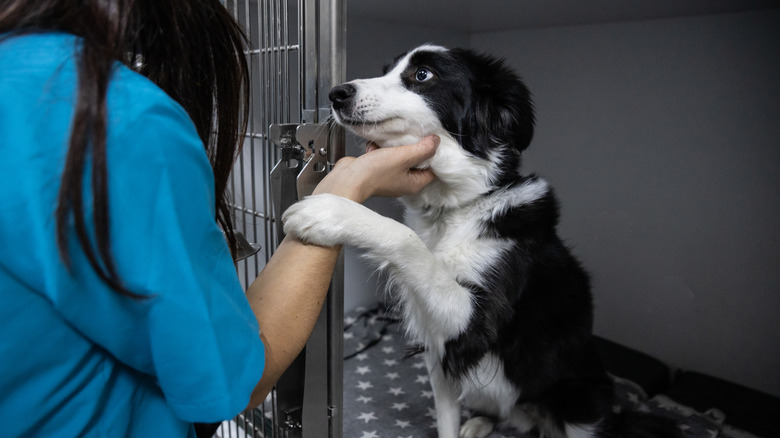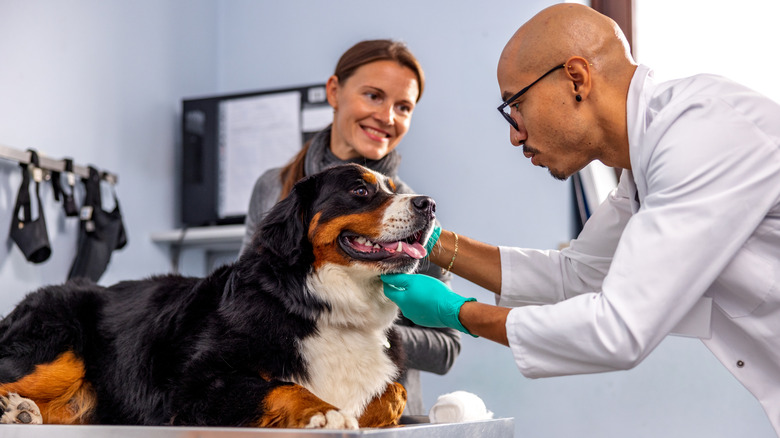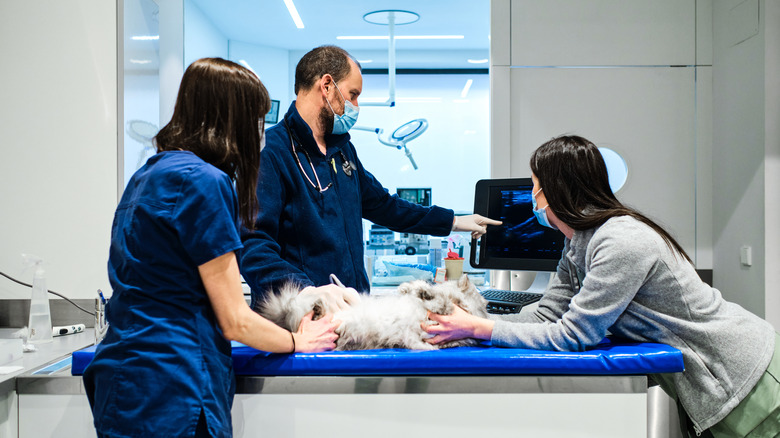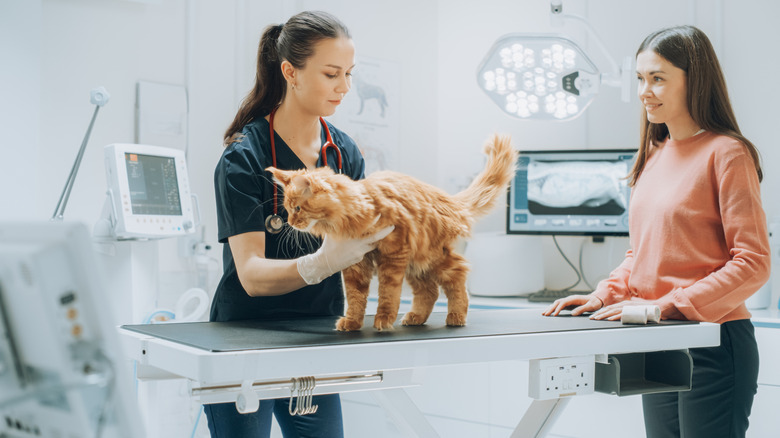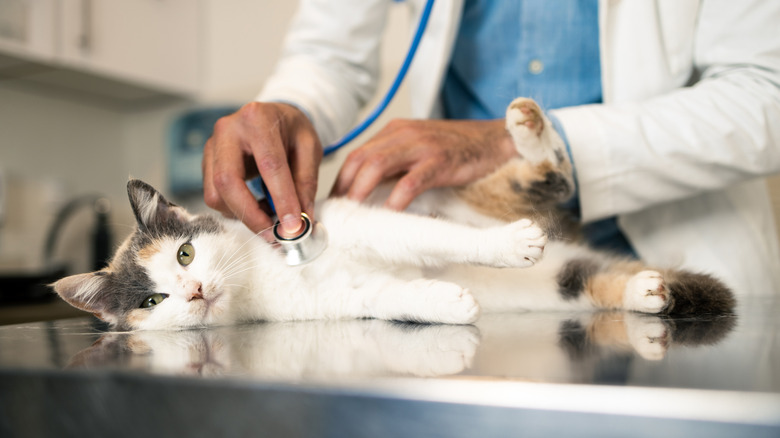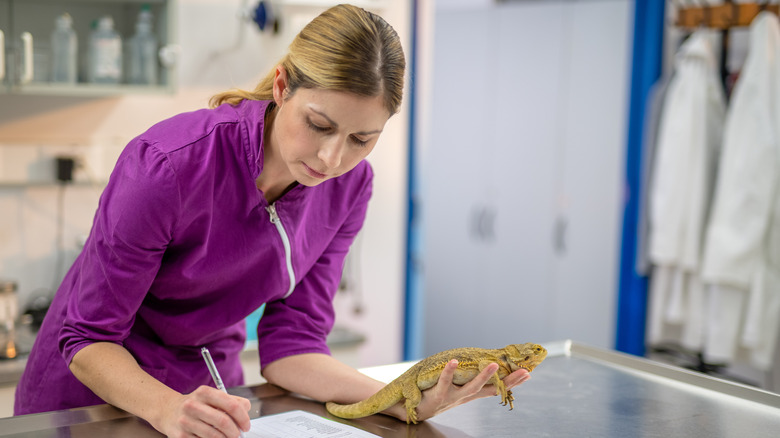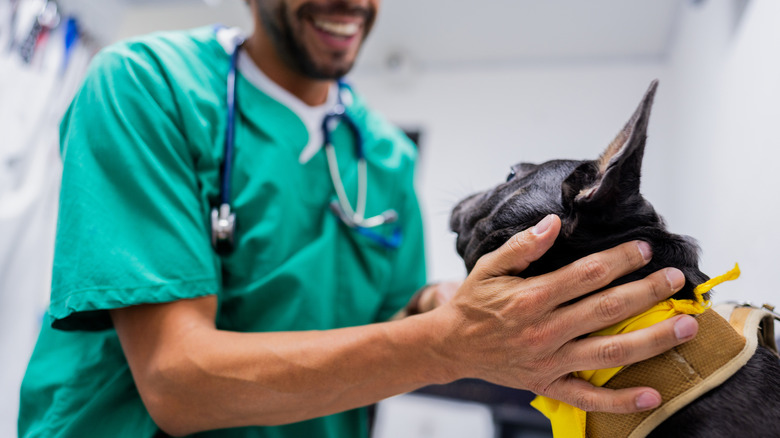Warning Signs That May Mean It's Time To Find A New Vet
When it comes to ensuring your pet's well-being, there's nothing more important than having a skilled veterinary team in your corner. You should feel confident that when trouble arises, you have a medical professional committed to addressing your concerns and setting your pet on the path to wellness. Unfortunately, there comes a time when you must consider whether your current veterinarian truly understands your pet's needs.
You know your pet better than anyone, and you should trust your instincts if you're unsure whether they're receiving quality medical care. For example, if you feel that you're constantly being nickel-and-dimed for minor services ($50 for a simple nail trim?), you may consider whether you're being viewed as a person or a profit. If you feel that your veterinarian doesn't have the nuanced knowledge to treat your pet, you might need to switch to a specialist.
Choosing another veterinarian isn't personal, and often, it boils down to a difference in personality rather than a knowledge issue. As a pet owner, you have the right to make informed decisions regarding your pet's health, along with choosing providers that prioritize their well-being.
Your veterinarian doesn't communicate properly
You should walk away from a vet visit fully understanding the details of your pet's treatment, diagnosis, and overall well-being. If you don't like your vet's communication style, this could prove more than inconveniencing; it could also lead to miscommunications regarding your pet's health. 2021 research from PLoS One emphasized that communication is critically important to both owners and veterinarians looking to improve animals' health. If you don't understand your pet's wellness profile, then you can't understand the implications this has for their well-being.
The study found that there are three communication challenges veterinarians face: language barriers, time constraints, and the involvement of multiple clients for a single pet. While these factors can undoubtedly cause complications when determining a course of treatment for your pet, they're not insurmountable. You deserve to have a veterinarian who speaks your language, makes time for your appointment, and delivers information to those who need it. You also deserve to have information in your preferred format, whether that's over the phone, text message, or email.
You question their expertise
There are many scenarios in which you may question whether a veterinarian has the skill, knowledge, or training needed to address your pet's health concerns. For example, your veterinarian may shrug off serious symptoms, such as persistent lethargy, loss of appetite, or pale gums. They might not even give you a chance to express your concerns or share other information about your pet's health history.
Here's another scenario in which you may question a veterinarian's knowledge and skill: you don't get your questions answered. If the veterinarian can't or won't address your concerns (or makes you feel bad for asking), you can't make informed decisions –– and that's not putting your pet's well-being first.
You may also doubt a veterinarian's expertise if they rely on "old school" treatment methods. PetMD explains that one such method is using sugar and honey to prevent lesions from becoming infected. While this offers the same end result as bandaging the wound, it's not exactly the newest, most cutting-edge knowledge. Out of personal preference, you may prefer a veterinarian in touch with the latest treatment methods.
The veterinarian's clinic feels chaotic
After being up all night with your reverse-sneezing puppy, you walk into the vet's office and are immediately hit with the smell of urine. As you approach the front desk, the employees seem harried, and you're deafened by the sound of barking as you're led into an examination room. The door closes, and you wonder whether you'll actually meet the vet or get lost in the shuffle.
This is a scenario that plays out all too-commonly in some chaotic veterinary practices. Staffing issues, time constraints, and an overwhelming number of patients can take their toll. Ultimately, this can create a stressful environment in an already stressful situation. Not only could this cause your pet's condition to worsen (as stress may lower the immune system's response), but it could affect your rational decision-making.
A veterinary clinic should be a peaceful, sterile environment that's centered on creating a positive experience with your pet's healthcare needs in mind. Feeling free to speak with staff, voice concerns, and explain your pet's symptoms can empower you to take an active role in their care. Calm and cooperative care is the key to making vet visits less stressful for your pet.
You feel taken advantage of financially
It's tough to think about, but ultimately, vet clinics are businesses. They operate by providing services and charging enough money to make a profit. Of course, this isn't to say that veterinarians are money-hungry and don't care about animals. Yet the financial aspect of vet clinics is something to keep in mind if you're feeling pressured to pay for certain services (such as excessive diagnostic testing) or are generally overcharged, potentially leaving you with a vet bill you can't afford.
There's no denying that caring for a pet can come with many hidden costs. But how do you know the difference between the industry standard and being exploited? Forbes shares that the average vet visit cost $61 in 2024, although this price could be higher based on whether your pet has unique healthcare needs, such as requiring the services of a specialist. The publication also notes that annual vaccinations for cats and dogs average about $25, while treatments for cancer can be around $4,000.
Here's a good way to see if you're being overcharged: Call local vet clinics and inquire about the cost of services you've been quoted for or used. Then cross-reference the details they provide with your latest vet bill or invoice. Armed with new information, you can decide for yourself whether your vet is charging you too much, or if it's just a result of inflation.
There never seems to be availability
Previously, you may have been able to get an appointment with your vet within a reasonable timeframe. Nowadays, it seems like you have to wait weeks for a slot to open up –- and it's never at a good time. While not every vet clinic has flexible hours or allows for walk-ins, if you consistently can't book an appointment with your vet, this could have long-term implications on your pet's health.
For example, you may get frustrated with the lack of scheduling and neglect to have your cat vaccinated for rabies. Then, when they get into a fight with a racoon months later, you fear they could have contracted the disease. In another scenario, your dog may suffer an acute illness and need to be seen immediately. Having to wait even a few hours could be detrimental. It's vital that your pet has regular access to vet care when they need it most. Prevention is pivotal to keeping your pet happy and healthy.
Your pet needs specialized medical care
Unless your veterinarian is board-certified in a certain type of practice (e.g., internal medicine, surgery, dentistry), they're likely the animal equivalent of a primary care doctor. They're the first line of defense when treating common illnesses and injuries, and they'll refer out to specialists for conditions beyond the scope of their knowledge. It takes a skilled veterinarian to understand the boundaries of their training and connect a patient with a colleague.
Unfortunately, not every veterinarian accepts their limits. They may run test after test, never getting any closer to a definite answer. Meanwhile, you're constantly paying for examinations and medications, all while your pet's health never improves. As a responsible pet owner, it's important to understand when it's time to consider visiting a veterinary specialist. That way, you can make the call, even if your primary care vet never recommends it.
You may consider taking your pet to a specialist if they need exploratory surgery for something like a tumor. You may also need to visit a radiologist to get x-rays and other images that can be used to diagnose your pet. Finally, you may also consider getting an opinion from a specialist if you suspect your pet has heart problems.
You don't have a relationship with your veterinarian
Ideally, you want a veterinarian who takes an interest in your pet, understands their health profile, and builds a relationship based on mutual trust. Together, you would be partners with the same end goal: ensuring that your pet lives a long, healthy life.
If you feel rushed out the door, unheard, or overlooked while interacting with your pet's veterinarian, this relationship can't happen. The result is a one-sided approach to veterinary care that can prolong your pet's recovery and even lead to problems in the future. Frontiers in Veterinary Science published a study in 2019 that shared a direct correlation with positive veterinarian-patient relationships and feelings of satisfactory medical care. The data speaks for itself: relationships matter when bettering pets' health.
Finding a veterinarian who's personally committed to managing your pet's long-term care may be easier than it sounds. Online reviews, word-of-mouth testimonials, and even phone consultations can connect you with a compassionate professional.
You feel disconnected from veterinary resources
Have you ever heard the saying, "It takes a village to raise a child?" A similar sentiment applies to your pet's health. It takes multiple healthcare providers working in tandem to ensure that you're prepared for the unexpected. For instance, while your cat may have a primary care physician, you should have a backup in case your pet experiences an after-hours emergency. You should also have the numbers of poison control and other hotlines.
Your veterinarian should offer information freely about hotlines, hospitals, and specialists, so you can make the right choices regarding your pet's health. You shouldn't feel as though you must rely on them for everything. If you feel as though you're backed into a corner with limited veterinary resources, this could be a sign that your veterinarian isn't acting in good faith. Overreliance on a single healthcare provider not only limits your options when emergencies arise, but it also cheats you out of other providers' perspectives.
Not connecting patients to third-party resources is a red flag with some vet providers. It could show that they have a poor reputation in the veterinary community and don't have the connections that could benefit patients. There could also be a financial motive; your veterinarian may not want patients (and profits) walking out the door in search of additional help.
Examinations only last a few seconds
The length of the average veterinary exam depends on multiple factors, from the reason for the visit to the animal itself. In a 2014 study involving small animal consultations, Vet Record noted that the average examination lasted anywhere from 51 seconds to just over 45 minutes. GenuisVets shared slightly different results, noting that the average dog examination lasted 30 minutes.
If it seems like your veterinarian barely examines your pet, this could pose multiple challenges. Firstly, you may feel financially cheated if you paid hundreds of dollars for a seconds-long consultation, only to still have concerns regarding your pet's health. A cursory examination could also result in medical errors, such as incorrect treatment, the wrong diagnosis, or failure to act within a reasonable period.
You want a veterinarian who takes the time to monitor your pet's vitals, check their weight, and use their specialized training to address your concerns. Thorough examinations go a long way in preventing medical errors that, while fairly uncommon in the veterinary world, according to Frontiers in Veterinary Medicine, can have catastrophic results.
You feel judged for your pet's condition
It's a fact of life that animals get sick or injured — sometimes these things happen despite our best efforts. Cats can fall out of windows. Dogs might eat chocolate (which is toxic!). Even hamsters can get themselves into trouble. However, you should never, ever feel judged for seeking medical attention for your pet. Your veterinarian should approach you in good faith as a concerned pet owner who wants the best for their animal.
Judging pet owners does nothing to improve animals' health; in fact, it may only increase the risk of medical non-compliance. A pet owner who feels shamed about their choices may not return to subsequent vet appointments, or they may feel uncertain about asking for clarity about treatment options. Both of these things can negatively affect a pet's chance of recovery.
There are many resources online that connect pet parents with compassionate, knowledgeable veterinarians. For example, the U.S. Department of Agriculture has a search engine that helps people find accredited vets who treat everything from cats and dogs to laboratory animals. This is a great place to start when searching for a veterinarian who respects your autonomy as a pet parent. Searching for a professional with AAHA accreditation could also improve your chances.
Your veterinarian mostly specializes in other animals
A veterinarian who primarily treats cats and dogs may not have the knowledge or skill set to treat pets with more unconventional needs. For example, imagine that your axolotl swallowed a pebble, and you bring it to the same veterinarian who sees your dog. While your vet may offer generalized insight, their lack of specialization may fail to improve your pet's health. They may not recognize certain symptoms, recommend a risky wait-and-see approach, or even view your pet as "lesser than."
Here's another concern with bringing your pet to a veterinarian whose focus lies with other animals. According to the Journal of the American Veterinary Medical Association, an increasing number of vets are treating exotic pets using "formularies to select drug dosages without consistently checking their sources." A veterinarian who does not primarily work with exotic pets may not see the errors in their calculations, which could lead to medication problems that jeopardize the animals' health.
If your pet's veterinarian doesn't focus on your species' practice area, now is the time to search for a new one. Don't wait for an emergency to strike! Ensuring that your pet can be seen by the appropriate professional is key to promoting their health.
Your pet's condition worsens or doesn't improve
After seeking veterinary care, it could take a few days for your pet to heal depending on their condition. For instance, viral conjunctivitis may require three to four weeks to completely resolve. In contrast, two days of giving a dog Praziquantel can completely eliminate tapeworms. So, it's not unusual for treatments to take a varied amount of time.
However, you know your pet better than anyone. If their condition worsens or doesn't improve after getting treatment, you may have concerns about their recovery. Upon hearing these concerns, your pet's veterinarian should spring into action, eager to address the issue and altering their treatment plan as needed. They shouldn't ignore your worries, let your phone calls go unanswered, or otherwise leave you scrambling for answers.
There is also no room for error when it comes to certain medical conditions, like the dangerous bloat that dogs can experience. This condition can become fatal within hours if a canine doesn't receive the necessary treatment. Every minute matters! You have every right to get a second opinion from another vet if you're worried about your pet's health. Depending on your experience, you may choose to leave your old vet behind and stick with a solution-oriented professional.
You feel pressured to buy extras
Going to the vet's office should center around improving your pet's health, not feeling like you're being soft-sold extras. Here's an example of this in play. You're making an appointment to have your rat spayed. During the examination, your vet says that if you really care about your pet, you'll buy her specially-formulated rat food, vitamins, and accessories to enhance her quality of life. And guess what! You can buy all of those things in the clinic's lobby.
This puts you in an awkward position. You shouldn't feel obligated to buy products sold at your vet's office, or that if you decline, your pet won't receive the attention they need. You should feel like your pet's veterinarian is truly invested in their health regardless of your budget or brand loyalties. Pets' health should come before profits. Period. You should consider other veterinarians if you feel that you're being seen as a dollar sign instead of a concerned pet owner.
You never actually speak to the veterinarian
Covid-19 had a major impact on the veterinary care industry. One result was the increased reliance on vet techs, (the animal medicine counterparts of nurses). During the pandemic, vet techs reported staffing shortages, an increased demand for veterinary care, and more responsibilities. While many vet clinics have resumed normal operations and have adjusted to their workflow, some haven't.
As a result, some pet parents find themselves playing a game of telephone regarding their animals' care. In these scenarios, a vet tech will take the pet's vitals, listen to the owner's concerns, and then share this information with the vet. Then, they'll serve as the middleman, relaying messages from the vet who may never examine the animal themselves. This can lead to miscommunication, misinformation, and generally feeling dissatisfied with the quality of care.
There's no doubt that vet techs are knowledgeable professionals who care about animals. Yet, when you go to the veterinarian's office, you want to talk to a vet. There's no substitute for getting information about your pet's health directly from the source. Speaking face-to-face with your pet's veterinarian ensures you understand the treatment options available and helps lay the foundation for a positive working relationship.
